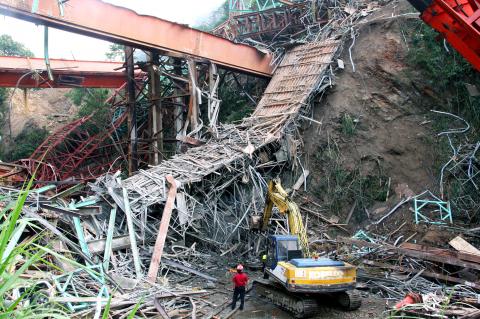Six workers died when scaffolding collapsed near the Beishan Interchange (北山交流道) in Nantou County on Freeway No. 6 yesterday afternoon, in the worst industrial accident since construction of the new freeway began.
The National Expressway Engineering Bureau (NEEB) reported that another three workers were injured in the accident and were being treated at the Puli Christian Hospital at press time last night.
At press time, rescuers were still trying to locate one other worker who was believed to be buried in the wreckage.

Photo: CNA
NEEB chief engineer Lu Jieh-bin (呂介斌) said the accident occurred at 1:45pm when the workers were installing a box girder in the westbound lane of the Beishan Interchange on the freeway.
“When they were grouting, the scaffolds that supported the box girder collapsed and the girder, scaffolds and the workers all fell from a height of 55m,” Lu said, adding that the cause of the accident was under investigation by the Labor Inspection Office.
He said reports showed that 10 workers were at the construction site at the time: three Taiwanese and seven migrant laborers.
To facilitate the rescue effort, the bureau said that it had requested assistance from the 10th Army Corps and from fire department officials.
Meanwhile, the bureau used large machinery and lighting equipment to continue its rescue efforts as night fell.
The Beishan Interchange is located between the Guosing Interchange (國姓交流道) and Ailan Interchange (愛蘭交流道) and will connect Freeway No. 6 to Provincial Highway No. 14 and County Highway No. 147.
Construction of the Beishan Interchange began on Jan. 19 last year and is scheduled to be completed by Jan. 13 next year.
The cost is estimated to be about NT$560 million (US$17.5 million).
Lu said the freeway section where the accident occurred is an overpass bridge that has tunnels at each end. The construction is dangerous by nature as the workers have to work on the higher scaffolds, Lu said, adding that the construction plan had been approved by the Council of Labor Affairs.

CHAOS: Iranians took to the streets playing celebratory music after reports of Khamenei’s death on Saturday, while mourners also gathered in Tehran yesterday Iranian Supreme Leader Ayatollah Ali Khamenei was killed in a major attack on Iran launched by Israel and the US, throwing the future of the Islamic republic into doubt and raising the risk of regional instability. Iranian state television and the state-run IRNA news agency announced the 86-year-old’s death early yesterday. US President Donald Trump said it gave Iranians their “greatest chance” to “take back” their country. The announcements came after a joint US and Israeli aerial bombardment that targeted Iranian military and governmental sites. Trump said the “heavy and pinpoint bombing” would continue through the week or as long

TRUST: The KMT said it respected the US’ timing and considerations, and hoped it would continue to honor its commitments to helping Taiwan bolster its defenses and deterrence US President Donald Trump is delaying a multibillion-dollar arms sale to Taiwan to ensure his visit to Beijing is successful, a New York Times report said. The weapons sales package has stalled in the US Department of State, the report said, citing US officials it did not identify. The White House has told agencies not to push forward ahead of Trump’s meeting with Chinese President Xi Jinping (習近平), it said. The two last month held a phone call to discuss trade and geopolitical flashpoints ahead of the summit. Xi raised the Taiwan issue and urged the US to handle arms sales to

State-run CPC Corp, Taiwan (CPC, 台灣中油) yesterday said that it had confirmed on Saturday night with its liquefied natural gas (LNG) and crude oil suppliers that shipments are proceeding as scheduled and that domestic supplies remain unaffected. The CPC yesterday announced the gasoline and diesel prices will rise by NT$0.2 and NT$0.4 per liter, respectively, starting Monday, citing Middle East tensions and blizzards in the eastern United States. CPC also iterated it has been reducing the proportion of crude oil imports from the Middle East and diversifying its supply sources in the past few years in response to geopolitical risks, expanding

Pro-democracy media tycoon Jimmy Lai’s (黎智英) fraud conviction and prison sentence were yesterday overturned by a Hong Kong court, in a surprise legal decision that comes soon after Lai was jailed for 20 years on a separate national security charge. Judges Jeremy Poon (潘兆初), Anthea Pang (彭寶琴) and Derek Pang (彭偉昌) said in the judgement that they allowed the appeal from Lai, and another defendant in the case, to proceed, as a lower court judge had “erred.” “The Court of Appeal gave them leave to appeal against their conviction, allowed their appeals, quashed the convictions and set aside the sentences,” the judges